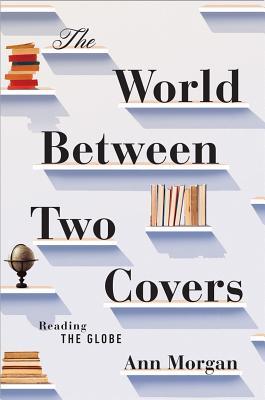 The World Between Two Covers: Reading the Globe by Ann Morgan
The World Between Two Covers: Reading the Globe by Ann Morgan Formats available: hardcover, ebook, audiobook
Pages: 326
Published by Liveright on May 4th 2015
Purchasing Info: Author's Website, Publisher's Website, Amazon, Barnes & Noble, Kobo, Bookshop.org
Goodreads
A beguiling exploration of the joys of reading across boundaries, inspired by the author's year-long journey through a book from every country.
Following an impulse to read more internationally, journalist Ann Morgan undertook first to define "the world" and then to find a story from each of 196 nations. Tireless in her quest and assisted by generous, far-flung strangers, Morgan discovered not only a treasury of world literature but also the keys to unlock it. Whether considering the difficulties faced by writers in developing nations, movingly illustrated by Burundian Marie-Thérese Toyi's Weep Not, Refugee; tracing the use of local myths in the fantastically successful Samoan YA series Telesa; delving into questions of censorship and propaganda while sourcing a title from North Korea; or simply getting hold of The Corsair, the first Qatari novel to be translated into English, Morgan illuminates with wit, warmth, and insight how stories are written the world over and how place-geographical, historical, virtual-shapes the books we read and write.
The World Between Two Covers is a book about thinking about what you read, and why you read it. By thinking about “why you read it” I don’t mean which genres you love (or don’t). The “why” in this instance is much more about “why are particular books available to you (or not)” than why you find a particular book or genre engaging.
Not that the author of The World Between Two Covers was not engaged with many of the books she read, and not that I wasn’t engaged in reading about her journey. Because she was, and I certainly was.
The story here is about her journey through books. She goes from what made her decide to take this journey, through her process of actually managing it. And along the way she dives into the realms of why certain books are and are not available, and what effect the overwhelming preponderance of the the Western, anglophone marketplace juggernaut may have on literature and its availability in the future.
It’s a lot to wrap into one book.
This is not a collection of her reviews of the books she read during her figurative year abroad. The reviews are available on the author’s website, appropriately named, A Year of Reading the World, which she did in 2012. This is her story about doing it.
Part of the fascination of the project is in the sleuthing. When one is exclusively a reader in the English language, one of the first hurdles one must climb over is that one needs to find English translations for everything one plans to read.
It turned out that an even bigger hurdle for the author was in determining what exactly constituted her “world” and then finding some work, sometimes finding any work, from a particular country. Not merely finding an English translation of a work, but finding a work at all.
Not every voice is heard. Some places don’t have a written literary tradition. Some places don’t have a publishing tradition. Everyone, everywhere has access to American and British lit, or at least they do if they have some access to the internet. But the converse is certainly not true. She found herself relying not just on the recommendations of strangers to find material, but also on the kindness of strangers to find, or in one memorable case, create, translations for her.
As someone who is part of the world of reading and reviewing, I found this glimpse into another writer’s process absoluting fascinating. As a librarian, I found her thoughts on the publishing and reading landscape gave me insight into conditions that we don’t think about too much.
But perhaps we should.
Reality Rating B: There are the books. Then there is the process of getting the books. And finally, there is the writing about books and reading and publishing and what it means when we stay within our own comfortable little houses of mirrors. And what it feels like when we don’t.
Each of the aspects of this book will have its proponents. And for those who are disappointed that the reviews are not included, the joy of the internet means that they are all still available at A Year of Reading the World.
For this reader, the heart of the book was in the way that the author thought about what she read and about the circumstances that made certain books available, and works by other countries very nearly impossible to track down.
In the U.K., where the author is based, only 4% of the books available are works in translation from other languages. In the U.S., that figure is estimated to be 3%. In other “First World” countries where English is not the dominant language, those numbers rise to 30% or 40%. Everyone consumes our product, but ours is not cross-pollinated by much material from anyone else. There are questions about the effect of this imbalance on literature as a whole. We read in an echo chamber, and it’s an echo chamber that we increasingly export to the rest of the world. And writers in languages other than English are increasingly writing to what they perceive as the U.K./U.S. Western market because that’s where the money is. But the question of what voices are being lost echoes throughout the book.
The author also speaks to the way that the books that we are used to support our Western-centric worldview, a perspective that often reinforces the view of the West as conquering heroes and bringers of civilization to places that are seen as less-enlightened. Stories from other parts of the world present a different and sometimes uncomfortable perspective for us, that we have created messes in places where we chose to tromp on the existing culture instead of understanding and working with it.
For a small and not too uncomfortable sample of this view, as a U.S. reader watch or listen to BBC News for a few days. The BBC reports on a lot of parts of the world that U.S. news doesn’t bother to cover, and for the BBC, the U.S. is quite naturally NOT the center of the universe. But I digress.
On the one hand, the internet is what made this book possible. Without the ability to contact people from all over the globe at the click of a “Send” button, and without the ability for people around the world to see her project and want to help, this book could not have happened. At the same time, the internet can be seen to a homogenization of culture and literature that may not be good for anyone, as the voice of the internet becomes more and more Western centric, anglophone, and increasingly controlled by corporate interests.
If you care about what you read, this book will make you think about it. Hard. And that’s an excellent thing.


















